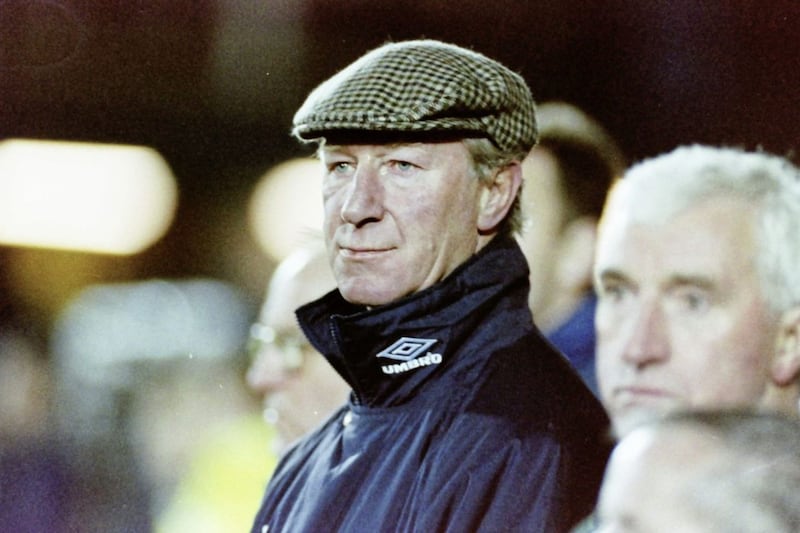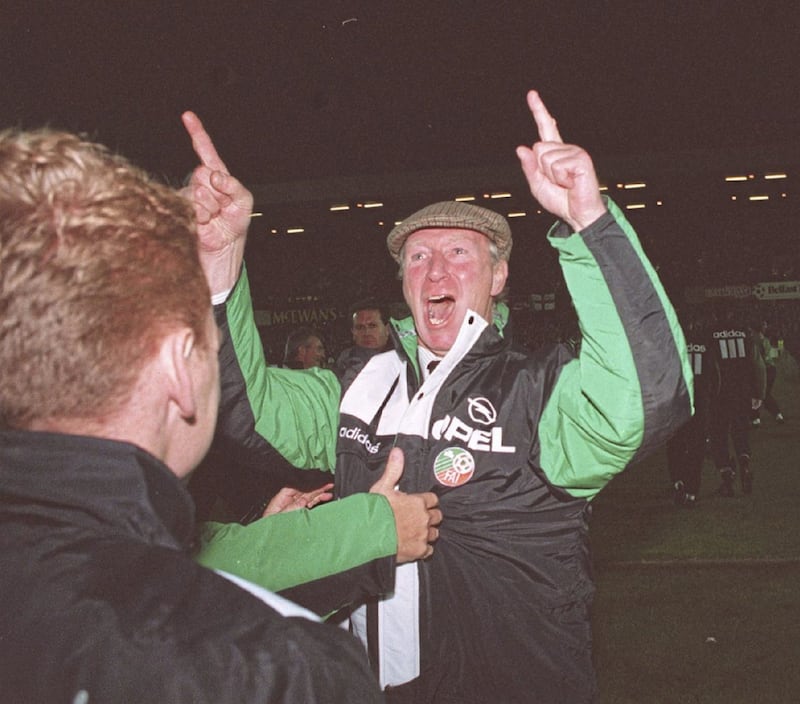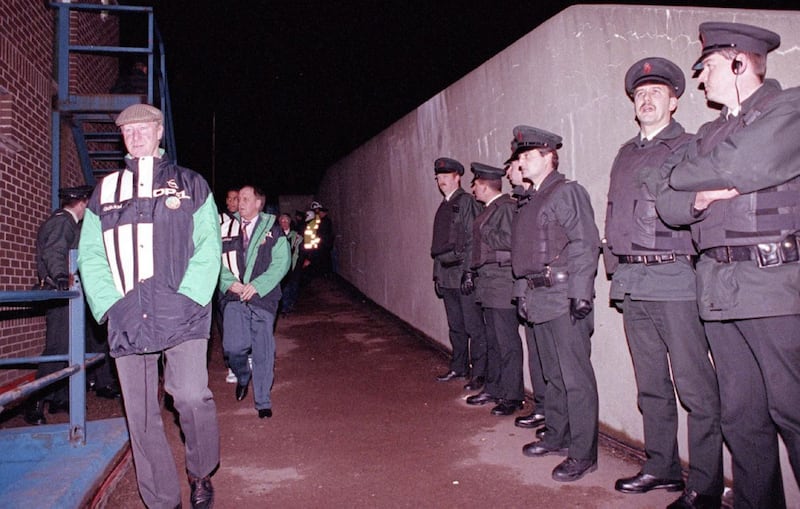The legendary Jack Charlton changed the face of Irish football and propelled the Republic of Ireland to three major finals. Following his passing last Friday, Brendan Crossan talks to his biographer Colin Young and RTE commentator George Hamilton about the Englishman's rich legacy...
‘Hey Mr Dream-seller, where have you been? Tell me have you dreams I can see? I came along just to bring you this song. Can you spare one dream for me?’ – Meet me on the Corner, by Lindisfarne folk band, 1971
AN HOUR before going on-air with ‘The Hamilton Scores’ on RTE Lyric FM last Saturday, the news flashed up on George Hamilton’s Twitter page that Jack Charlton had passed away.
Throughout his weekend radio show, Hamilton was consumed with trying to find the right track, the right lyrics that would, in some small way, do justice to the impact the 1966 World Cup winner had on the Irish nation.
Just as he did 30 years ago in Genoa, when David O’Leary stepped up to take that famous penalty – ‘The nation holds its breath’ – Hamilton plucked the right track, the right lyrics from his collection and made a gallant stab at summing up one of Ireland’s favourite sons.
Charlton was Hamilton’s occasional co-commentator several years before he was appointed Republic of Ireland manager in late 1985.
A mutual respect had grown between the pair over the years, even when Hamilton had to put the hard questions to the no-nonsense Englishman.
“I wanted to play something appropriate,” Hamilton explained.
“There was a folk band called Lindisfarne who took their name from a holy island off the Northumberland coast which is where Jack’s from. It was a folky kind of song. It’s called ‘Meet me on the Corner’.
“It starts off: ‘Hey Mr Dream-seller, where have you been? Tell me have you dreams I can see? I came along just to bring you this song. Can you spare one dream for me?’
“I slipped that song in during the show and said: ‘Listen to the words’, and it got a lovely response on the texts and mail. People sent in all kinds of lovely messages, ‘A nation dries its eyes’ and stuff like that.”
Jack Charlton passed away on Friday after being diagnosed with lymphoma. In recent years, he also suffered from dementia.
Charlton spent his entire playing career with Leeds United (1952 to 1973) and won 35 caps for England during which time he was part of Alf Ramsey’s lauded World Cup winning side in ’66.
He enjoyed managerial spells with Newcastle and Middlesbro before replacing Eoin Hand as Republic of Ireland manager after the side narrowly missed out on a place at the 1986 World Cup finals in Mexico.
Charlton remained at the helm for 10 years, achieving eye-watering success.
Under the Englishman, Ireland made debut appearances at the European Championships in 1988 and competed in back-to-back World Cups in 1990 and ’94, the high point of which was reaching the quarter-finals at Italia ’90.
Charlton was charismatic, at-times belligerent and always straight-forward.
“Ireland, in the 1980s, was a pretty miserable place,” Hamilton said. “Depressed outlook, going nowhere – and the metaphor was the dilapidated state of Lansdowne Road with no floodlights, which meant mid-week international football matches had to kick off at half-two.
“That’s where Charlton came in, and where he went out was December 1995 when they lost a Euro play-off to Holland at Anfield.
“Ireland had become a big player in Europe when Jack arrived.”
Hamilton added: “We went from dark Wednesday afternoons to the glittering lights of two World Cups and a European Championships. He lifted it and it would never again go back down to where it was.
“I’m not one of those people who said that the Celtic Tiger was the result of Jack Charlton’s football team but Jack Charlton’s football team fed into the national mood which created a feel-good factor.
“When you think from 1921 to 1986 – that’s 60-something years. The team had not reached a major tournament. It’s difficult to put this without sounding offensive, and in no way do I mean it to be disparaging towards the GAA, but the GAA takes place in an Irish context – the International Rules notwithstanding.
“Rugby is a relative niche market and the rugby World Cup is a new invention and only began the year after Charlton was appointed. So Jack was coming into manage at the world’s greatest team tournament – the World Cup and the European Championship second to that.”

**********
Highly-respected journalist Colin Young, who works as a football correspondent in England’s north-east, penned the authorised biography of Charlton in 2016.
During his research for the book, Young got to know the Charlton family very well – to such an extent he spent a day fishing alongside the great man and his friend Bill Logan on a stretch of the River Tyne.
Young, who also covered the Republic of Ireland from the early ‘Noughties’ up until recently, described casting a line with Charlton as a “magical day”.
Of course, the ravaging effects of dementia had taken a firm grip of Charlton’s senses.
“I knew from the time that I’d spent with him that he was still fishing and I knew how frustrated he was because he didn’t have the independence he had all his life,” Young explained.
“He had his driving licence taken away which was indicative of that loss of independence. To fish, he had to have a guy with him, his mate Bill had built a kind of a belt where Jack could stand in the river and he could hold and balance him so that allowed him to still fish.
“I remember getting in the car and he didn’t realise I was coming. He turned round and said: ‘Oh, the laird with the boo-k.’
“I loved the fact that he couldn’t remember my name, which I didn’t see as any part of his long-term illness, because he’d always been crap with names and mixing people up.
“So I was happy to be identified as the ‘laird with the boo-k’. I always loved that Northumbrian drawl.
Young added: “Jack was almost unaware of my presence, so everything I recorded was like a fly-on-the-wall documentary.
“He was asking where we were heading, why were we heading there, and what pies Bill had bought, which was probably the most important aspect of the morning.
“As much as he loved football he loved the outdoors - fishing and hunting. That was his real passion. We went back to his house and were speaking to [Jack’s wife] Pat and having a wander around the garden with him. He loved talking about growing tomatoes and stuff like that, there was very little talk of football.”
In the book, Young captures the sectarian backdrop of that infamous night at Windsor Park in November 1993 when the Republic of Ireland drew with Northern Ireland in a desperately tense World Cup qualifier that saw Charlton’s men reach a second consecutive finals in America.
The roots of the animosity between the two coaches, Young says, was when Charlton appeared to write off the north’s chances once the qualifying draw was made and the group comprised the two Irelands.
“[Charlton] dismissed Northern Ireland’s challenge without even knowing he had done so,” writes Young.
“He said it would be between Ireland, Spain and Denmark, but Northern Ireland didn’t even get a mention. Their manager [Billy] Bingham, and an entire country, were hurt by the snub.”
The Republic fired three goals past the north at Lansdowne Road as the crowd chanted, ‘One team in Ireland’.
But the return leg was an entirely different affair. Northern Ireland were already out of the running for a place at the ’94 finals, but they wanted to deny their southern counterparts qualification.
Jimmy Quinn put the home side one up on 73 minutes and Bingham jigged with delight before substitute Alan McLoughlin grabbed a late equaliser to silence the Windsor crowd.
Angry words were exchanged between the two managers on the sideline as Young recalled Charlton trying to smooth things over with his old adversary in the press room after the game.
Charlton said: “Afterwards I made it my business to seek Bingham out, barging in on his press conference with a remark, intended to be jocular: ‘It’s alright, Billy, I’ve not come to flatten you.’
“And Billy, competitive to the last, says: ‘It’s okay Jack, you wouldn’t be able to manage it anyway.”
Part of Charlton’s legacy, Young says, is how he transformed the perceptions of English people and the Irish tricolour.
“It’s important to recognise Jack was an English World Cup winner coming over to Ireland at the height of the Troubles and not just transforming football in the country but actually transforming perceptions of English people and the tricolour flag.
“In ’87, there was a different connotation if you flew the Irish flag in your garden or at your house back then. I’m not saying he did it on his own but there is no doubt he helped change the perception of that flag and what it meant to the whole country – and over in England as well.”

Not everybody embraced Jack Charlton however. The Ireland manager and journalist Eamon Dunphy became sworn enemies, with the latter quickly emerging as a vociferous critic of the team’s direct style of play.
Dunphy argued that Ireland had sufficient quality to play a more attractive brand of football.
Charlton pointed to Ireland's lamentable qualification record.
Results always trumped aesthetics especially for a nation that longed for a World Cup or European Championships berth
Hamilton said: “John Aldridge told the story about playing under Jack. It was not his game to be running into the corners and getting in behind the opposition defence, and making them turn. And this was Aldridge talking: ‘When you’re told this and you go out and do it and it works, you say: ‘Well, fair enough. This is the way we play.’
“So they all bought into it when they saw that it worked. As a centre half himself, Jack figured that he didn’t like turning around and facing his own goal, so this is what he wanted the opposition to have to do – and it worked.”
Young also assessed that Charlton’s style of play was “much more sophisticated” than lumping the ball forward and chasing lost causes.
“He was the man who put Irish football on the map,” the author said.
“From years of looking at that Ireland squad and thinking: ‘How on earth have we not qualified for a major tournament?’
“He did that and turned world soccer on its head. And that didn’t happen by accident. A lot of people thought: ‘Kick and rush, long-ball game and give-it-a-lash.’
“But it was much more sophisticated than that. I was reading about how Pat and Jack were out at the 1986 World Cup in Mexico and he looked at it and thought: ‘I know how to cause some problems if I have a decent team.’
“His Irish teams pressed and do what Liverpool are doing now, pressing the opposition. In many ways, he isn’t given enough credit for that.”
No matter how people judge Charlton’s methods during his 10-year reign, he revolutionised the face of Irish football for the better.
He was Ireland’s Mr Dream seller. And he delivered on that dream many times. Euro ’88, Italia ’90 and USA ’94.
And many of us lived to tell the tale of Stuttgart, Genoa and New Jersey.

Tributes...
(Paul McGrath, former Irish international): “Today, I am truly heartbroken at Jack’s passing. It is difficult for me to articulate what Jack meant to me both on and off the football field.
“Throughout his ten years as manager of our International team, Jack backed me as a footballer and as a person - he became a father figure to me.
“He gave me his full support when I needed it most and for which I am forever grateful. He has been a hugely important person in my life.
“The Irish people warmed to him because of his big character and he gave us the belief in ourselves to compete in the big tournaments. I am very honoured to have been a part of Jack’s journey.
“Today is a sad day for the Irish football community and we all owe him a huge gratitude for the joy and memories he has given us. He is a man I genuinely loved. My thoughts today are with Pat and the Charlton family. Thank you Jack – sleep well. Paul
**********
Niall Quinn (former Irish international):“Jack Charlton led the band. He brought us, as a players and fans, to places we never thought possible beforehand and gave us so many precious moments. He changed lives. For his players, he gave us the best days of our lives.”
**********
Mick McCarthy (former Irish captain and manager): “I did speak to him very briefly the day after his birthday but it was difficult due to his health. I told him I loved the bones of him that day and I always will.”
**********
Ronnie Whelan (former Irish international):“So sad to hear of the passing of big Jack. He brought some magnificent times to the people of Ireland and made players believe that we did indeed belong at European championships and World Cups. RIP Jack.”
********
Stan Collymore (former England international):“A legend in England. A legend in Ireland. Rest in Peace, Big Jack. May the lake be tranquil and the fish be plentiful.”
********
Mary Lou MacDonald (Sinn Fein leader):“Jack Charlton was Ireland's most beloved Englishman. Sorry to hear of his passing. He kept 'em all under pressure and kept us all cheering the boys in green on. Ar dheis De go raibh a anam.”
********
Andy Reid (former Irish international):“As an 8-year-old I went to the homecoming of the Ireland team from Italia 90, hundreds of thousands of people lined the streets! Jack Charlton started something that we are all benefiting from! Ar dheis Dé go raibh a anam.”
********
Chris Donnelly (Irish News columnist):“Ireland’s favourite son of England. He made Irish sporting hope and history rhyme. Thanks for the many glorious memories, Jack.”







